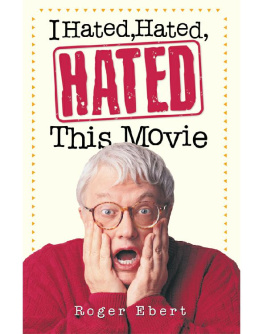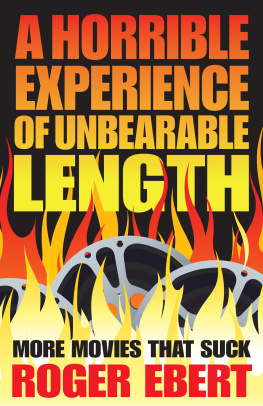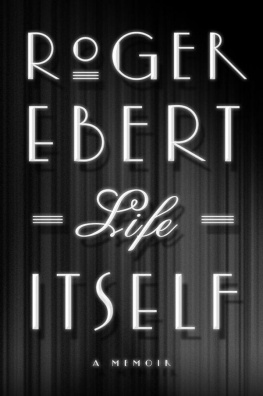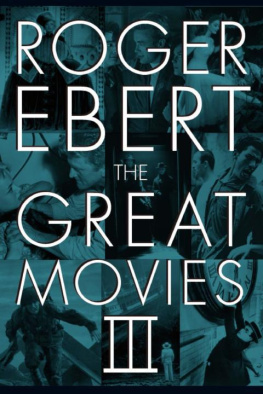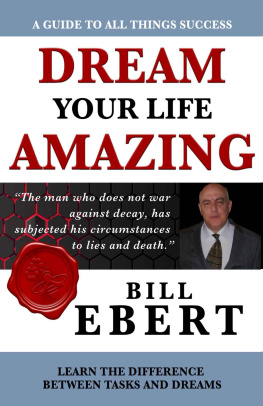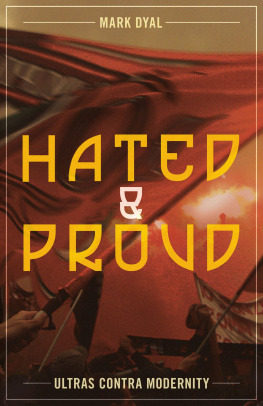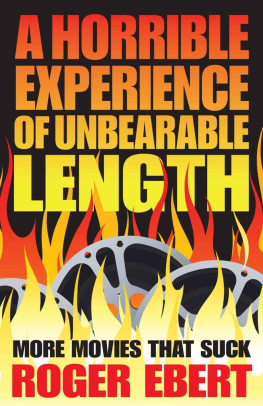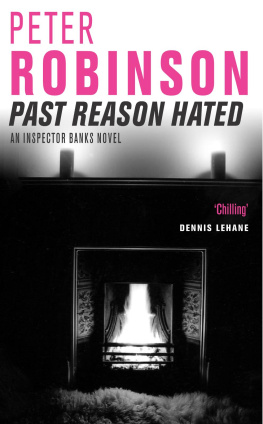Ebert - I hated, hated, hated this movie
Here you can read online Ebert - I hated, hated, hated this movie full text of the book (entire story) in english for free. Download pdf and epub, get meaning, cover and reviews about this ebook. City: Kansas City, year: 2000, publisher: Andrews McMeel Publishing, genre: Detective and thriller. Description of the work, (preface) as well as reviews are available. Best literature library LitArk.com created for fans of good reading and offers a wide selection of genres:
Romance novel
Science fiction
Adventure
Detective
Science
History
Home and family
Prose
Art
Politics
Computer
Non-fiction
Religion
Business
Children
Humor
Choose a favorite category and find really read worthwhile books. Enjoy immersion in the world of imagination, feel the emotions of the characters or learn something new for yourself, make an fascinating discovery.
- Book:I hated, hated, hated this movie
- Author:
- Publisher:Andrews McMeel Publishing
- Genre:
- Year:2000
- City:Kansas City
- Rating:3 / 5
- Favourites:Add to favourites
- Your mark:
- 60
- 1
- 2
- 3
- 4
- 5
I hated, hated, hated this movie: summary, description and annotation
We offer to read an annotation, description, summary or preface (depends on what the author of the book "I hated, hated, hated this movie" wrote himself). If you haven't found the necessary information about the book — write in the comments, we will try to find it.
I hated, hated, hated this movie — read online for free the complete book (whole text) full work
Below is the text of the book, divided by pages. System saving the place of the last page read, allows you to conveniently read the book "I hated, hated, hated this movie" online for free, without having to search again every time where you left off. Put a bookmark, and you can go to the page where you finished reading at any time.
Font size:
Interval:
Bookmark:



Dancers
(Directed by Herbert Ross; starring Mikhail Baryshnikov; 1987)
The idea is not exactly new: The story of a ballet is echoed by the real lives of the people who are dancing in it. But Herbert Rosss Dancers easily is the most dim-witted recent example of the genre, using Giselle to so little effect that perhaps the only way to save this movie would have been to substitute Peter and the Wolf.
See if any of this sounds familiar. Mikhail Baryshnikov plays Tony, the greatest male dancer of his age. While rehearsing for a film version of Giselle in Italy, he finds himself overtaken by a vague discontent. Things are just not right. Then, one day across a crowded restaurant, he spies the newest member of his company, a seventeen-year-old American teenager with big eyes and long hair. In a grand gesture, he sends her an entire ice-cream cake, and their romance is under way.
So far, the storys not implausible. I know a lot of people who would go to bed for an ice-cream cake. What is unacceptable about the movie is its refusal to supply the teenager (Julie Kent) with any human qualities other than hero worship and to assume that she would fall in love with Baryshnikov just because he is a famous man and he wants her to. Doesnt decency require them to at least pretend to have something in common?
The movie is so ineptly structured that maybe it doesnt even matter. The Baryshnikov character lays his usual line on her, something about a tall white tree he saw in his childhood, and meanwhile rehearsals for Giselle continue. But this is not even an interesting movie about show business.
Everything I have ever heard about the filming of ballet movies leads me to believe that the set usually resembles Fassbinders Beware of a Holy Whore, in which venomous and embittered malcontents hang around the hotel bar telling lies about each other, but not here. On the set of Giselle, much depends on Long Looks. Baryshnikovs current and former lovers lurk in the wings, looking significantly at him and each other. We read volumes into their gazes, because we have to, and because the movie gives us little else to think about.
One of the best gazers in the movie is Kent, who learns after the magical white-tree story that Baryshnikov has told it to other womenthat, indeed, she may not be the only woman in his life. This causes her such distress that she stands in the wings during a dance sequence and provides not one but two Long Looks. We see in her eyes that she is shaken and in despair. If we look closely enough, we see something else. It appears that the editor, William Reynolds, has had to use the same close-up twice.
The girl runs out of the theater. The dance continues. Then there is a search for her. Call the police! Baryshnikov cries, and then her jacket is found in the sea, soaking wet. This turns out to be a real mystery after she turns up on land, dry. The movie eventually ends after more dancing.
Dancers does not provide (a) interesting ballet sequences, (b) a coherent plot, (c) a romance of any description beyond the unsatisfactory requirements of Unrequited Love, or (d) pretty pictures. It has one distinction, though. It is one of the worst movies of the year.
The Dark
(Directed by John Bud Cardos; starring William Devane, Cathy Lee Crosby; 1979)
Movie critics arent supposed to give away the plots of thrillers. Thats part of the unwritten agreement with their makers. The other part of the unwritten agreement, though, is that thrillers should have plots. Since The Dark breaks its side of the bargain, I feel blameless in forging ahead.
This is without a doubt the dumbest, most inept, most maddeningly unsatisfactory thriller of the last five years. Its really bad: so bad, indeed, that it provides some sort of measuring tool against which to measure other bad thrillers. Years from now, Ill be thinking to myself: Well, at least its not as bad as The Dark.
The movie involves a Jack the Ripper from outer space, who has superhuman strength, can tear down brick walls with his bare hands, and has eyes that emit lightning flashes. He kills someone every night. The police are trying to catch him.
Thats about it. The killings are not only unmotivated, but uninvolving, since only strangers get killed. They appear in the movie, walk into dark parking garages, and are murdered. The creatures favorite means of attack is to pull off his victims heads. Wonderful. The press nicknames him The Mangler, a title that could more accurately be bestowed on the director.
The Dark alternates the nighttime attacks with endless scenes of cops lecturing each other on how important it is to catch the Mangler. But the case is finally broken open when the father of one of the victims (William Devane) and a local TV newscaster (Cathy Lee Crosby) team up to solve it. A psychic has predicted that a young actor will be the next to go, so they pub-crawl through actors haunts to find him. They do, he speeds drunkenly away in his car, they follow, the police tail them, and everyone ends up in a deserted monastery where the Mangler is cornered.
Hes a tough creature to destroy. Hes about six feet six inches, looks like the Wolf Man, snarls and growls a lot, and zaps everybody with his lightning bolts. The special effects are so bad, by the way, that at times the lightning bolts do not seem to come from his eyes, or to hit their targetsbut never mind, the victims topple over anyway. Gunshots dont affect the creature, but after hes set on fire, he disappears in a puff of smoke.
What is this creature? Where does it come from? How to explain its chemistry, its appetites, its violence? Great questions, I guess, for the sequel. The movie ends with a panorama of Los Angeles and a narration assuring us that mankind must always be afraid of the Dark, because in the vastness of the universe, etc., we are like blind men tapping our way into infinity, etc.
One of the amazing things about The Dark is that its only about 85 minutes longshort for a feature film, if more than long enough for this one. If theyd gone all the way and shot for 120 minutes, they might have qualified for the most stupefyingly boring movie ever made. Maybe they win that one anyway.
Day of the Dead
(Directed by George Romero; starring Joseph Pilato, Lori Cardille; 1985)
The zombies in Day of the Dead are marvels of special effects, with festoons of rotting flesh hanging from their purple limbs as they slouch toward the camera, moaning their sad songs. Truth to tell, they look a lot better than the zombies in Night of the Living Dead, which was director George Romeros original zombie film. His technology is improving; perhaps the current emphasis on well-developed bodies (in Perfect, Rambo, etc.) has inspired a parallel improvement in dead bodies.
But the zombies have another problem in Day of the Dead: Theyre upstaged by the characters who are supposed to be real human beings. You might assume that it would be impossible to steal a scene from a zombie, especially one with blood dripping from his orifices, but you havent seen the overacting in this movie. The characters shout their lines from beginning to end, their temples pound with anger, and they use distracting Jamaican and Irish accents, until we are so busy listening to their endless dialogue that we lose interest in the movie they occupy.
Maybe theres a reason for that. Maybe Romero, whose original movie was a genuine inspiration, hasnt figured out anything new to do with his zombies. In his second zombie film, the brilliant Dawn of the Dead (1980), he had them shuffling and moaning their way through a modern shopping mall, as Muzak droned in the background and terrified survivors took refuge in the Sears store. The effect was both frightening and satirical. The everyday location made the zombies seem all the more horrible, and the shopping mall provided lots of comic props (as when several zombies tried to crawl up the down escalator).
Next pageFont size:
Interval:
Bookmark:
Similar books «I hated, hated, hated this movie»
Look at similar books to I hated, hated, hated this movie. We have selected literature similar in name and meaning in the hope of providing readers with more options to find new, interesting, not yet read works.
Discussion, reviews of the book I hated, hated, hated this movie and just readers' own opinions. Leave your comments, write what you think about the work, its meaning or the main characters. Specify what exactly you liked and what you didn't like, and why you think so.

